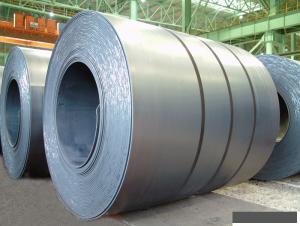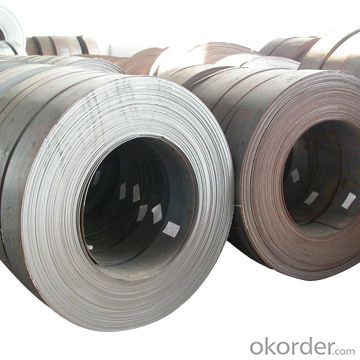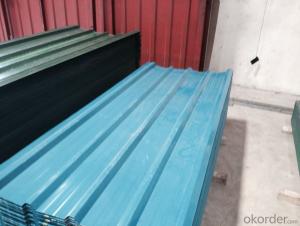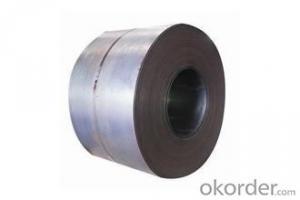Steel Coil Container Manufacturing Automobile Electrical Appliance Model G3131
- Loading Port:
- China main port
- Payment Terms:
- TT OR LC
- Min Order Qty:
- 1000 m.t.
- Supply Capability:
- 10000 m.t./month
OKorder Service Pledge
OKorder Financial Service
You Might Also Like
Structure of Hot Rolled Steel Coil Description
Hor rolled steel coil for container manufacturing and machinery manufacturing
Rolleds its to final dimensions while it's hot enough to scale, our hot rolled steel is an amalgamation of the various quality of steel. It can be in the form of plates, sheets and coils. Our hot rolled steel coils are applied to a wide range of uses such as automobile, electrical appliance, machinery manufacturing.
Cold rolled steel is manufactured from hot rolled, annealed and pickled strip by cold rolling on polished rolls. Depending on the thickness desired, the cold rolling requires various numbers of passes through the mill to effect the necessary reduction and to secure the desired surface characteristics and mechanical properties.
Main Features of Hot Rolled Steel Coil
Hot rolled Good quality JIS G3131 SPHC
. Flexible and durable
. light and easy to transport
. Fast delivery
. Item shipped from Dubai warehouse
Hot Rolled Steel Coil Images
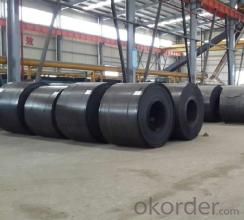
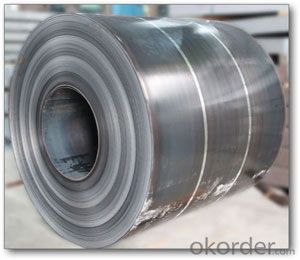
Hot Rolled Steel Coil Specification
Commodity: Hot Rolled Steel Coil
Grade: JIS G3131 SPHC from China
Size: 1. 95-17. 8mm x 1250-1500mm x C
FAQ of Hot Rolled Steel Coil
We offer Insurance and customer order
Standard export package,suit for all kinds of transport or as required
- Q: How many pounds can steel lift?
- much too vague. Need the shape and thickness of the steel, where it is supported, and where the load is placed.
- Q: looking to buy a sashimi knife. what is the difference between white steel (1and2) and blue steel (1and2) in terms on characteristics. what gets sharper? what holds edge longer? basically any info on the pros and cons of each steel would be SO GREATLY APPRECIATED! thanks in advance to all who answer. i'm leaning towards white-2 steel for my first sashimi knife, started training on the sushi bar and need a new tool!
- Actually okorder /
- Q: I know of the cheaper steel shot for waterfoul hunting, but there is more expensive shot available. Is it worth the money, how much more distance are we talking, and what do you like the best?(brand name)
- All buckshot I can think of at the moment is lead. Steel shot is used for waterfowl hunting because lead is illegal for that use. They don't want all that lead shot falling back in the water and causing lead contamination. There would be no reason to make steel buckshot, and it would be pretty ineffective. Steel is much less dense than lead. So a steel 00 pellet would weigh much less than a lead 00 pellet. So it would carry a lot less energy to a target. Buckshot is used for just that, Bucks. Well large game like deer, bear, and for self defense. In uses like that you need that extra energy. Lead shot is used for everything, except where lead shot is illegal, which is waterfowl hunting. Steel shot really isn't very popular anymore. Waterfowl shot just can't be lead. It doesn't have to be steel. They've come out with other stuff, like bismuth, that is a lot more dense than steel, but still not as dense as lead.
- Q: Guitar?I have a steel- string, but prefer nylon.:)
- Steel string. More resonance, better sound quality and control.
- Q: What are the common uses of coated steel coils?
- Coated steel coils are commonly used in various industries such as construction, automotive, appliances, and electronics. They serve multiple purposes including structural support, corrosion resistance, aesthetic appeal, and durability. These coils are extensively used for manufacturing roofing materials, siding, gutters, HVAC systems, automotive body parts, and electrical enclosures, among many other applications.
- Q: How much should someone sell a 6 ft stainless steel counter? How about one with a sink?
- Sheet stainless steel is about $2.00 to $2.75 per lb. in the US right now for a 2B stainless steel without any special finish. The cost of a sink or counter is going to vary widely. The labor to fabricate it is going to be a lot higher than the material cost so the price per pound is not going to tell you much. In California a custom 6' counter would be somewhere between $1,200 and $3,000. A standard size single compartment sink would be about half of that.
- Q: What are the challenges in storing and handling steel coils?
- Storing and handling steel coils present several challenges, including their sheer weight and size, which can make transportation and storage difficult. The coils need to be stored in a way that prevents damage and deformation, as steel coils are susceptible to rust, corrosion, and scratching. Additionally, ensuring proper ventilation and moisture control is crucial to prevent the growth of mold or moisture-related damage. Safety precautions must also be taken during handling and transportation to avoid accidents or injuries.
- Q: Hey everyone.I have a whetstone and a honing steel. I purposely tried to make one of my knives less sharp twice to see how well the whetstone and honing steel would work.It even seemed that when I was using my whetstone it wasn't as sharp as it was when I used my honing steel, but when I also used my honing steel after having sharpened my knife on the whetstone, it was razor sharp.I was wondering, is the whetstone only supposed to be used when the knife edge isn't as flat anymore or something? Like, only when it doesn't really have an edge anymore?Please explain your answer.Thanks everyone.
- You're not supposed to use the whetstone alone. It leaves a burr, which the steel removes. If you google using a whetstone, you'll see plenty of info. It is possible to use a finer stone in place of the steel.
- Q: How are steel coils inspected for uniformity?
- Steel coils are inspected for uniformity through a series of visual and mechanical tests. Firstly, the external appearance of the coil is examined to ensure it is free from any visible defects such as dents, scratches, or rust. This is important as it ensures the coil's overall integrity and prevents potential issues during further processing. Next, the thickness of the coil is measured at various points using non-destructive testing techniques like ultrasonic or magnetic particle inspection. This helps identify any variations in thickness, which could affect the coil's overall quality and performance. Additionally, the width of the coil is measured using precision instruments to check for any deviations from the required specifications. This ensures that the coil is within the desired width range, which is crucial for compatibility with downstream processes and applications. Furthermore, the weight of the coil is measured to verify if it falls within the specified range. This is typically done using weighing scales or load cells, ensuring that the weight is consistent and meets the required standards. In terms of internal inspection, steel coils are sometimes subjected to eddy current testing, a non-destructive method that detects surface and near-surface defects. This technique uses electromagnetic induction to identify any irregularities in the metal, enabling the identification of defects such as cracks, voids, or inclusions. Overall, a combination of visual inspections, thickness measurements, width checks, weight verification, and internal testing methods ensures that steel coils are thoroughly inspected for uniformity. These rigorous inspection processes help guarantee the quality and reliability of the coils, allowing them to meet the industry standards and customer requirements.
- Q: What is the current value of steel? Is it expected to increase in value?
- The steel in steel cents is the same as the steel in soup cans you throw out all the time. There is no sense in holding steel cents for their value as scrap. There are way too many steel cents around for them to ever have much numismatic value.
Send your message to us
Steel Coil Container Manufacturing Automobile Electrical Appliance Model G3131
- Loading Port:
- China main port
- Payment Terms:
- TT OR LC
- Min Order Qty:
- 1000 m.t.
- Supply Capability:
- 10000 m.t./month
OKorder Service Pledge
OKorder Financial Service
Similar products
Hot products
Hot Searches
Related keywords
